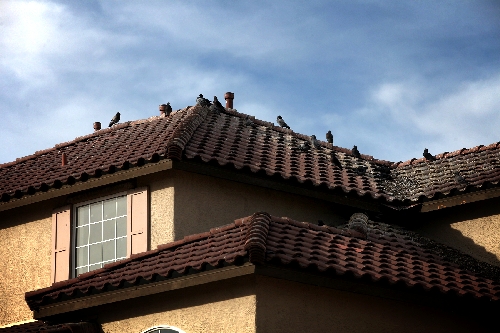Commissioner wants to make it unlawful to feed pigeons
They're the valleywide princes of poop. The taloned titans of trash. The feathered foot soldiers of Fremont Street. The winged wanderers of the Strip.
Thousands of pigeons waddle among ankles in residential and tourist-heavy areas daily hoping something edible will fall to the ground.
The ever-growing pigeon plight has caught the attention of the Clark County Commission, with one commissioner hoping to offer a "coo" de grace to their numbers through an ordinance that would outlaw intentionally feeding the beaked beggars.
The proposed change also would make it unlawful for any person to allow food scraps to be discarded in a manner that results in "lingering, roosting and/or congregating of pigeons."
Commissioner Chris Giunchigliani, whose district includes part of the Strip, will bring the issue of pigeon control to her colleagues at Tuesday's commission meeting. She could not be reached for comment because she is out of the country until next week, according to her office.
The county ordinance would define "pigeon" as common pigeons, also known as "city pigeons, rock doves, rock pigeons or flying rats."
The request for change falls in line with other areas of the valley, including Henderson.
The Henderson City Council voted in September to declare pigeons a public nuisance and cite residents for encouraging the roosting or linger of the birds by feeding them. That city's law relies on a complaint-based system.
In Las Vegas, pigeons are considered a nuisance in the city's animal control ordinance, which addresses many of the same issues in the county proposal.
However, the ordinance asks residents to eliminate food sources and suggests purchasing an "artificial predator" such as an owl, hawk, snake or cat to post in an area where pigeons congregate. Shooting pigeons or using explosive devices to scare them away is unlawful in the city.
Giunchigliani's proposal would not apply to the lawful trapping of pigeons, injured pigeons kept in cages at all times, pigeons kept and maintained for recreation, communication, show, racing or food, and unintentional feeding from using bird feeders -- if the person hasn't been given written notice concerning the lingering, roosting or congregating of pigeons.
It's unclear whether fines would be assessed for noncompliance.
Commissioner Tom Collins said he will support the proposal, although people could solve the problem with pellet guns or shotguns.
After all, he shot four last week that were pecking at cow pies.
"I've got no problem with some senior citizen that doesn't like to play bingo feeding ducks or pigeons on a bus bench," Collins said. "They serve a purpose in our community, and it's a shame we want to get rid of them. I think it's silly."
Commissioner Susan Brager said she would support the proposal if it doesn't require more county resources in shrinking the "dirty bird" population.
"As long as we're not going to put more money in, I don't mind supporting it, but I will have some questions," Brager said. "I can't do that in good conscience. ... I think enforcement would be hard to do. This is well meaning and a great idea but will probably help more in educating people."
ENFORCEMENT ISSUES
Although the law would be on their side, local pigeon policing companies said that it would be difficult to enforce and that people need to be educated about the impact of feeding.
Michael Gardner, owner of Pigeons Be Gone, said the county doesn't have enough manpower to deal with the birds.
"The issue is you'll have to catch them in the act of putting feed out," Gardner said. "That's difficult. Pigeons can find food. They're very resourceful. They don't need someone putting out birdseed. (The proposal is) a small step, but it's a huge step. You have to have the law there to enforce it. Hopefully in time it will get better."
Gardner took issue with the bird feeder portion of the ordinance.
"Little birds will go to the feeder, and a lot of the seed will fall on the ground," Gardner said. "Pigeons are eating the seed on the ground. It's a pointless law to put into effect if you're not going to stop people with bird feeders."
Nephi Oliva, who operates Nevada Pigeon Control, said intentional feeding isn't the problem; it's the trash that people throw on the street, much of it containing food.
Oliva said one pigeon generates about 25 pounds of droppings annually, which means 80 birds can generate one ton of droppings per year. The birds carry about 60 diseases that can cause respiratory problems for humans.
"You can't put forward a partial solution," Oliva said. "You're not doing anything about the trash. I've never heard of a law being a solution to pigeon control. It requires people on the street dealing with the problem."
When it comes to crafting a law, Oliva said he doesn't understand why county officials aren't reaching out to the experts.
This isn't the first time the county has tried to deal with the pigeon population. Last year, it bought birth control-laced feed to help reduce the population at some parks.
While county officials deem the program effective, pigeon experts say the process does nothing to lessen the numbers.
"What they don't realize is the pigeons at Sunset Park don't sleep and live there," Oliva said. "You're not addressing the reproductive core. You're only feeding a certain percentage of that flock."
Contact reporter Kristi Jourdan at kjourdan@review
journal.com or 702-455-4519.


















